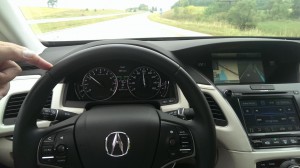
Less than one in three drivers are interested in owning a self-driving vehicle, but of those who want one, they're will to pay an extra $4,000.
The vast majority of American motorists are aware that a new generation of autonomous vehicles will soon take to the highways. While they like the idea of being able to lay back and relax, less than one in three drivers say they actually would want to own a self-driving car.
Those that would want to buy one would be willing to pay as much as a $4,000 premium, according to a new study by AutoPacific, Inc.
“Consumers are divided on autonomous driving, just as they are on many other issues facing society,” explained George Peterson, president of AutoPacific. “For some, this technology can’t come soon enough. Others appear to dread it.”
Virtually every major automaker is working on some form of autonomous driving system. Toyota sees the technology as a way to assist drivers – who would remain in control – while Japanese rival Nissan plans to have a fully self-driving vehicle on the road by 2020. Cadillac, meanwhile, plans to introduce its SuperDrive system on the planned CT6 flagship sedan in 2016, but it will only allow hands-free driving on limited access highways.
In one form or another, autonomous driving technology has been one of the big headline generators this past year, so it is likely no surprise that the AutoPacific study found a full 80% of U.S. motorists aware of the concept.
(Recalls aside, automobiles becoming safer than ever. For more, Click Here.)
Still, only 29% of those surveyed actually said they would want to eventually own an autonomous vehicle. Among those who wouldn’t want one, four out of five said they simply prefer to drive themselves. About half cited liability issues, with an equal number concerned the technology would simply be too expensive. Others raised questions about reliability, safety and the cost of repairs.
As to those who would want to own an autonomous vehicle, seven out of 10 said they like the idea of being able to relax while driving, 66% saying they expect the technology to improve highway safety. Reducing stress and improving fuel-economy were other factors, while more than one in three said they would like the opportunity to be able to work or multi-task rather than having to focus on driving duties.
(Click Here for details about the UAW’s Southern win.)
Trust appears to be a big factor in the survey’s findings – a full 42% of respondents believing that even in a fully autonomous vehicle, motorists should be required to keep their hands on the wheel.
(To see more about the Chevy Colorado’s win as Motor Trend’s Truck of the Year, Click Here.)
“It would take some time for consumers to have a high enough comfort level with the reliability of autonomous vehicle technology to fully disengage from the driving process. Requiring hands on the wheel provides a mental safety mechanism against computer failure,” explained Peterson.
The AutoPacific study’s findings are in line with other recent surveys that have found plenty of interest in autonomous vehicle technology – though motorists will need a lot more convincing before they’re ready to let a self-driving car park itself in their driveway.

The lawyers are probably viewing autonomous vehicles as the second coming of gold!